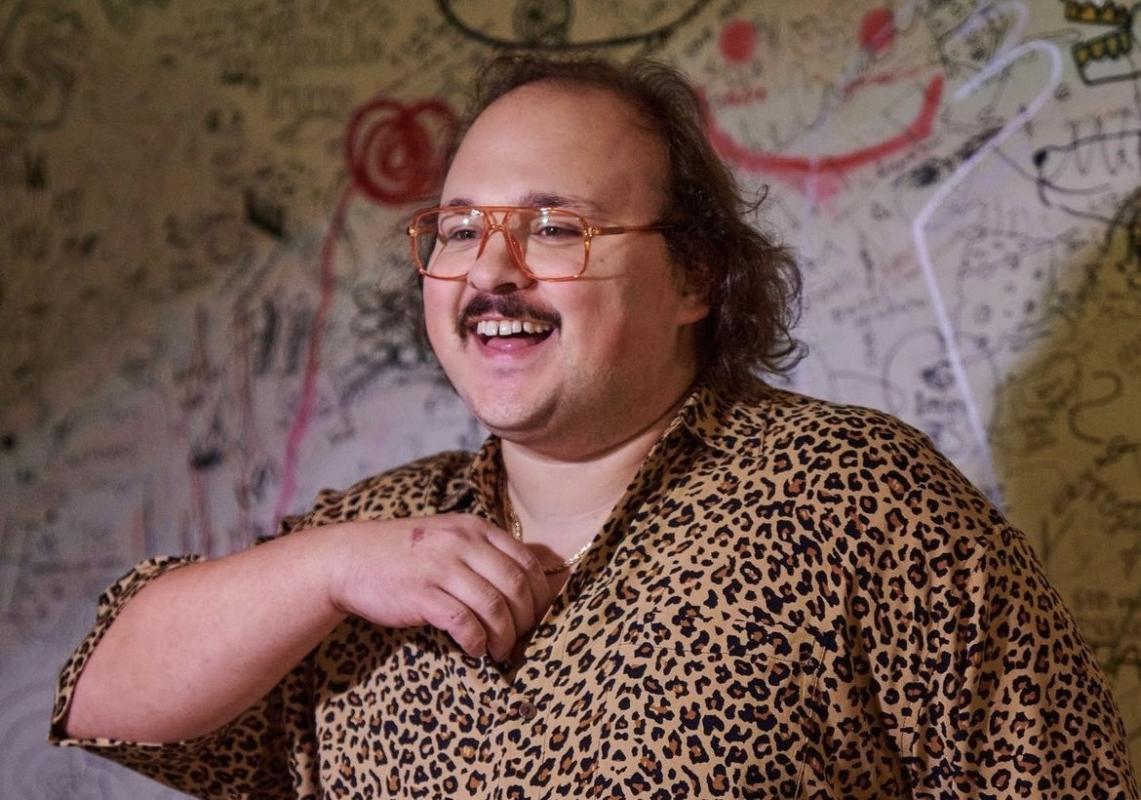
[Editor’s Note: 9/5/24: This fall, Halkias will be returning to The Lyric for two “Home for the Holidays” performances November 29-30. Tickets go on sale Sept. 6, 2024 at 10 a.m. Last year, in advance of his first Lyric residency, we interviewed the comedian about growing up in Greektown and the inspiration behind his viral videos. Read the full Q&A, below.]
Ronnie was pissed. Following the Ravens overtime loss to the Colts on Sept. 24, his popular Ravens recap on Instagram made that abundantly clear. “How the f*** did we lose to the Colts, yo?” the shirtless Ronnie wailed, putting the signature Bawlmer emphasis on his o’s. “What did I do to deserve this God?” Ronnie is, as many fans know, the Joe Flacco-loving, Bawlmerese-speaking Ravens superfan persona created by Southeast Baltimore native comedian Stavros Halkias.
Stavvy, as he’s more lovingly known, is hitting his stride. His debut stand-up special, Live at the Lodge Room, has 5.5 million views on YouTube. He’s touring the country this fall for his Fat Rascal Tour, which rolls into Baltimore for six hometown shows at The Lyric Oct. 12–14.
We spoke to Halkias two days after that loss to Indianapolis and found him to be much smarter and more serene than Ronnie.
Where in Baltimore did you grow up?
In Greektown, my friend. On Ponca Street, maybe two blocks from St. Nick’s Greek Orthodox Church.
What was your Greek restaurant of choice?
This is very political for me because I know everyone who owns every Greek restaurant. So I’m going to hear it one way or another. But my mom was a waitress at Ikaros, so I had their food a lot. I had the calamari. I still dream of that surf and turf. I can taste it right now. But Zorba’s was great. I feel like Zorba’s, it took them a couple of years to fully embrace the indoor smoking band. And then Samos, of course, for a nice souvlaki. Those are my go-tos.
I’ve heard you speak about the fact that your parents are immigrants. How do you think that influenced your childhood and your comedy?
[Immigrant] parents move to a country for opportunity. Nobody wants to be away from their family for fun. I was the firstborn, so there’s that, kind of pressure to make it worth it for them. As a little kid, that’s kind of heavy. I was good at standardized testing, so I think that gave my family a false sense of how much potential I had in the workforce. Comedy-wise, I always wanted to do it, but spending your 20s in bars telling jokes about your penis feels like it’s not really what your dad had in mind when he tearfully said goodbye to his parents 30 years ago. So that was kind of hanging over my head a little bit.
But there’s also so many positives. We’ve got a really tight-knit community. It’s really cool to be able to feel like I’m part of two cultures and two worlds. We still have family in Greece, I speak Greek. There were so many interesting characters, and it is a very funny culture. Everybody busts balls and everybody is borderline rude to each other. And so there was a lot of that comedy DNA in Greek culture. Once I focused on comedy, I think I did channel all that pressure and work at it as hard as I could.
You’ve mentioned on your podcast that you performed for the first time at (the now defunct) EJ’s Landing in College Park. How did your first foray into stand-up comedy go?
That performance was this thing I built up in my head. I’d been preparing for a year, six months, whatever. And the closer it gets, the more nervous I am. Then you get there and it’s eight people who are also on the open mic, who are all going over their notes. And then it’s like two local drunks. It’s a Tuesday at like 7 p.m. It’s a guy who’s hosting the open mic because they pay him 30 bucks and he gets to eat for free that day. You definitely felt like it was the kind of establishment that’s only in business because they let 19-year-olds drink. That energy was palpable, but I did okay. I’m sure if I watched the tape I’d be like, “Jesus, that was embarrassing. I bombed.” But I got a couple chuckles, and that was kind of it, man. As long as you’re not horrifically embarrassed, you’re like, “All right. I could do this.” And then I was off to the races. I kept doing very shitty open mics for a couple of years.
Was there an inflection point or breakthrough when you realized that comedy was going to be your career?
Probably when I moved to New York. I was doing stand-up in Baltimore for years. I won Magooby’s Joke House local comedian of the year. And to me, I’m like, “Well, that means I’m headed for the big time.” You get to headline a little bit here and there. I look back on it, and it’s like, “Yeah, there’s 12 people on that show. You just got to go last, and you got to make 40 bucks.” But to me, that’s the be-all, end-all.
And then I moved to New York. I’m 25 or 26, and I say to myself, “Give it a couple of years and we’ll see how it goes.” And I’ve just been very lucky. I just haven’t had to stop. When I moved to New York I was like, “I’m not going to be one of these guys that does open mics until he’s 39 years old and clings to a five-minute Comedy Central video. If it comes down to it, I’m going back to Baltimore, and I’m running a surf and turf restaurant.” And since moving to New York, it’s been one little thing after another, and it kind of snowballed. There was never the humbling moment that told me I had to pack up.
You’ve done a lot of stand-up in Baltimore. Is a Baltimore crowd different than crowds in the rest of the country?
Yeah, man. I mean, you know you’re in Baltimore. It’s rougher. There’s no way around it. If they don’t like you, they’ll let you know. I loved it because you have these, kind of rough rooms where you know they want pretty traditional stand-up comedy. You can be vulgar. They want maybe something a little edgier. And then I would drive down to D.C. and you would get these stuffy, yuppy types. In Baltimore you got some rough and tumble crowds that are mad you turned off the Ravens game so you could do dick jokes.
Have you played The Lyric before?
No, dude.
What’s it going to mean to you?
I can’t believe it. I still don’t understand what’s going on. I work on my act, and I’ve been very fortunate that my ticket sales have gone up because I put out a lot of stuff on the internet and I found success that way. But The Lyric is where I saw Chris Rock when I was in high school. The Lyric was where I saw Louis C.K. I’ve seen my heroes there. And it’s a huge room. And look, these are the most tickets I’ve sold in my life. If I show up and the guy at The Lyric is like, “Just kidding. You didn’t sell any tickets. You’re actually at Magooby’s this weekend,” I’d be like, “Of course. Sorry, I don’t know what I was thinking. I don’t belong here. They do the opera here.” I try and stay humble and not let this stuff get to my head, but this one in particular feels incredibly special.
I’ve been very lucky that, because I started doing these dumb Ravens videos, I think that’s really helped my following in Baltimore. So it’s this really special thing for me where you know, not only is it a big accomplishment stand-up wise, but to do it in your hometown feels incredible. I can’t tell you how much I’m looking forward to these shows.
Speaking of your Ravens videos, how’d you come up with this character Ronnie?
I grew up in Southeast Baltimore. I spent a lot of time in and around Dundalk. Anyone who’s spent time in Southeast Baltimore, in Essex, Dundalk, knows that we have our own specific brand of white trash. They’re the funniest guys in the world. And that was it, man. It was like an homage to these guys. I didn’t create the character—Baltimore created the character for me. And I just kind of channel that guy.
[Being] any kind of sports fan kind of takes you back a little bit developmentally. You become tribal. I don’t care about Pittsburgh in my day-to-day life, but when football’s on, we’re at war with these people. I want these people arrested and jailed for daring to beat us in our football game. I’m jealous of a guy like Ronnie because the man is not self-conscious at all. He says what he thinks. It was like honoring one of our greatest cultural exports, which is our type of white trash, while also honoring my favorite football team.
So what’s Ronnie’s outlook for the rest of the season following a particularly tough loss?
The beauty of Ronnie is when they’ve lost, the Ravens suck, and everyone’s an idiot in the organization, and it’s time to burn it all down. But when they win, the Ravens are headed for the Super Bowl, and they can do no wrong. There’s no nuance in Ronnie. He’s a very black-and-white guy. So right now, he’s very anti-the organization. He might even be looking up the personal home addresses of coach John Harbaugh. He might be planning to take matters into his own hands if the winning doesn’t start again. But overall, I think he’s going to bounce back. He was very confident in the beginning of the season. He predicted a 17-0 regular season for the Ravens.
